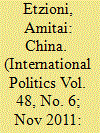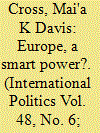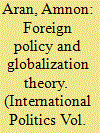| Srl | Item |
| 1 |
ID:
108377


|
|
|
|
|
| Publication |
2011.
|
| Summary/Abstract |
Commentators in the Western media, the United States Congress and academia are increasingly contending that China is on its way to becoming a threatening global force, an adversary, if not an enemy. This article examines whether those views are justified, after first establishing the importance of critically assessing all claims that a nation is turning into an adversary. The examination proceeds by summarizing the arguments of those who consider China an adversary in the making - the 'adversarians' - and the responses of those who hold China is leaning toward a peaceful development and should be engaged - the 'engagers'. The discussion is organized into three segments, each analyzing the debate with regard to the different sectors of power: military/geopolitical, economic and ideational. The concluding sections explore alternative American responses to China's rising power in each of the three sectors.
|
|
|
|
|
|
|
|
|
|
|
|
|
|
|
|
| 2 |
ID:
108379


|
|
|
|
|
| Publication |
2011.
|
| Summary/Abstract |
Smart power is defined as the effective combination of both hard and soft power. The concept is increasingly used in policy and academic debates, yet a clear understanding of what it actually means is still lacking. As a result, there is little serious consideration of how smart power can contribute to long-standing debates about power in international relations. This article seeks to clarify the meaning of smart power through first analyzing its main components - hard and soft power - separately; and second bringing these components together to re-conceptualize smart power. The aim is to make smart power more analytically useful, and to outline the various ways in which hard and soft power can be combined effectively. The author considers the case of Europe to argue that it is mainly a soft power and sometimes a smart power.
|
|
|
|
|
|
|
|
|
|
|
|
|
|
|
|
| 3 |
ID:
108380


|
|
|
|
|
| Publication |
2011.
|
| Summary/Abstract |
Since the early 1990s, international relations has witnessed a stimulating debate on globalization. This debate laid the foundations for globalization theory (GT), providing the tools for an empirical examination of the globalization of multiple activities: from politics and organized violence, to finance, trade and production, through culture and environmental degradation. However, examination of what appear to be the best-known works on globalization reveals that foreign policy has been virtually excluded from GT. In this context, based on what is described here as a synergistic transformationalist approach (STA) to globalization, I provide a critique of GT. The critique is geared towards examining why foreign policy hitherto has been overlooked by contemporary GT. I expose the problems this generates and address them by exploring how STA enables GT to incorporate foreign policy. I use the case of Israel heuristically to elicit how incorporating foreign policy into GT may provide a better understanding of the relationship between foreign policy and globalization. Three themes are highlighted: the role of foreign policy in inducing and reproducing globalization; determining the mutually constitutive relationship between globalization and the state; and shaping the interfacing between international politics and globalization.
|
|
|
|
|
|
|
|
|
|
|
|
|
|
|
|
| 4 |
ID:
108378


|
|
|
|
|
| Publication |
2011.
|
| Summary/Abstract |
This article analyses the European Union's (EU) lack of legitimacy for European citizens. It examines the expanding credibility gap of the EU since the Treaty of Lisbon Irish referendums in 2008 and 2009. Although there are various reasons for the EU's lack of legitimacy, this article proposes the failure of the EU to penetrate the domestic public or social spheres and the dearth of opportunities for citizen participation in EU governance as primary factors. The article then considers risks associated with the current euro crisis, drawing lessons from the largely ignored sociological and political factors that impact on its resolution.
|
|
|
|
|
|
|
|
|
|
|
|
|
|
|
|